
Reg.
Trib. Milano n. 418 del 02.07.2007
Direttore responsabile: Elisabetta Brunella
International Edition No. 88 year 7 - 9 November 2012 |
Dear readers,
Between 29 August and 2 September 2012 in Amsterdam, the ninth edition of "DigiTraining Plus: European Cinemas Experiencing New Technologies" was held. The course, which was attended by 35 European cinema professionals from 13 different countries, reconfirmed the success it has been having since 2004: over the nine editions, more than 85% of participants have stated that they were generally very or extremely satisfied with the "DigiTraining Plus" events organized by MEDIA Salles in the 2004-2012 period and considered them to be well or perfectly in line with the objectives, content and procedures planned in 90% of cases. In this issue you will also find an account of the conference "From 35mm to Digital: the switch-off point", organized by MEDIA Salles at the Venice Festival, during which the most recent figures on the development of digitalization in Europe were presented, reporting the situation of digital screens at 30 June 2012. Our monitoring of the financing schemes made available for the transition by the Italian Regions also continues, with an update on the situation presented in DGT online informer no. 82. Lastly, I am pleased to announce the dates of the next edition of the "DigiTraining Plus" course, which in 2013 will take place in Poland from 28 August to 1 September with a new subtitle - "New Technologies for the European Cinemas of the Future" - which we shall be writing about in more detail in our next issue. Mark the appointment in your diaries! Luigi Grispello, |
Save the date! The tenth edition of DigiTraining Plus will take place in Poland from 28 August to 1 September 2013 Follow the updates For further information, please send an email to digitraining@mediasalles.it |
Advertising spaces available! If you're interested, please send an email to press@mediasalles.it Click here to see the 2011 edition of DiGiTalk. |
MEDIA Salles at the Venice International Film Festival presents the state of digital cinema in Europe at 30 June 2012
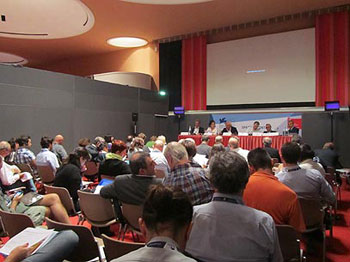
"From 35mm to Digital: the switch-off point" was the title of the conference organized by MEDIA Salles, in collaboration with Open Sky, during the 69th Venice International Film Festival.
The latest MEDIA Salles statistics on the development of digitalization in Europe at 30 June 2012, announced at the same Venice Festival, provided the basis for the round table dealing with the key points of the transition now that Europe has digitalized over 60% of her screens and the moment of switch-off for film is drawing closer.
The event compared the Italian experience to that of some other European countries who have succeeded in coming up with efficient economic models, and took stock of the technological innovations and the new prospects opening up for European cinemas.
The conference was opened by Luigi Cuciniello, Director of Organization at the Festival, who recalled that the world's longest-lived Festival has very soon opted for the new technologies, so that in 2012 as many as 95% of the titles were screened in digital format.
Elisabetta Brunella, Secretary General of MEDIA Salles, presented the most recent figures on the development of digital cinema in Europe, published in the European Cinema Journal 2-2012, a special edition produced for the Venice Festival.
At 30 June 2012 Europe's digital screens amounted to close on 22,000, with a 17.4% growth rate compared to the beginning of the year, when there were 18,566.
In Europe as a whole the rate of digital penetration has now reached 60.5% but growth is taking place at varying paces on individual markets.
Alongside countries that had already achieved 100% digitalization in 2011 (Norway and Luxemburg), there are still several territories where the new technologies regard less than a quarter of screens, such as Turkey, Slovenia, Greece, Serbia.
Even in the six largest countries differences are to be seen. Whilst the United Kingdom (86%) and France (80%) see penetration rates that are well over the European average, Germany has digitalized only 54% of her screens, and Spain (43%) and Italy (47%) remain below even the 50% threshold.
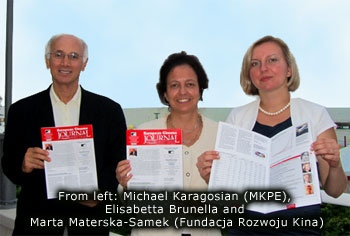 It was the situation in Italy around which the first half of the conference revolved, introduced by the President of MEDIA Salles, Luigi Grispello, who presented the results of a study on the development of digitalization in Italy, emphasizing the fact that the pace of transition varies greatly according to the type of cinema involved and pointing out the difficulties encountered in particular by traditional cinemas (with 1 to 5 screens).
It was the situation in Italy around which the first half of the conference revolved, introduced by the President of MEDIA Salles, Luigi Grispello, who presented the results of a study on the development of digitalization in Italy, emphasizing the fact that the pace of transition varies greatly according to the type of cinema involved and pointing out the difficulties encountered in particular by traditional cinemas (with 1 to 5 screens).
There followed a debate between representatives of the cinema industry and the institutions. Nicola Borrelli, Director General for the Cinema at the Ministry of Cultural Affairs, exchanged opinions with Lionello Cerri, President of the ANEC (the Italian Cinema Exhibitors' Association), Mario Lorini, President of the FICE (the Italian Art house Cinema Association), and Egidio Viggiani (Moviemax Italia), representing the Distributors' Section of ANICA (the Italian Producers' and Distributors' Association).
The focus on the Italian situation was accompanied by the presentation of some "best practices" from Europe.
The Dutch exhibitor Raymond Walravens (Rialto Film) presented the Dutch initiative Cinema Digitaal, which, launched in 2011 by combining public and private resources, has allowed even independent theatres to convert fully to digital projection.
Thanks to initiatives by the national exhibitors' association (NVB) and distributors' association (NVF), 170 independent exhibitors, for a total of over 500 screens, formed a sort of buyers' group which was thus able to negotiate a collective VPF, involving all the distributors operating in the Netherlands, thanks also to State intervention through the Netherlands Film Fund.
Marta Materska-Samek (Fundacja Rozwoju Kina) gave an account of the "Malopolska Project", which, with support from the European Regional Development Fund, made it possible to achieve the digitalization of cinemas in the Krakow region.
Based on a network of 18 local art-house cinemas, the "Malopolska d-cinemas network", opted for digitalization with a view to improving the offer of cinemas and making the region more attractive to tourists.
Of particular interest were the case studies presented, particularly that of the little town of Wadowice, where the local cinema has adapted to religious tourism centering on the figure of Pope John Paul II.
| The final session opened up to wider horizons with a glance at the world scenario and the cinemas of the future, now that switch-off time is approaching.
The talk by Michael Karagosian (MKPE) focused on new technological developments, from high frame rates to the new opportunities offered by digital in a field of considerable current interest, i.e. the accessibility of cinemas to those with impaired sight or hearing. |
It was the turn of the Netherlands to host the ninth edition of DigiTraining Plus: European Cinemas Experiencing New Technologies, the MEDIA Salles course addressing professional players in the European cinema industry who wish to bring themselves up to date with the new technologies. The Netherlands: a model for 100% digitalization |
Economic models: their importance is crucial for the remaining 40% of European screens that have yet to convert to the new technologies After the overview provided by Olivier Hillaire (Manice), other best practices in Europe were presented: Ania Sienkiewicz spoke about the support provided by the Polish Film Institute for the digitalization of Polish cinemas, with the added aim of creating a network of art-house cinemas offering programming that centres on the screening of domestic and European films. Silvana Pasqualino (EACEA) then presented the support mechanism implemented by the European Commission's MEDIA Programme for the digitalization of the Continent's movie theatres. The picture was completed by Sègbastien Nicolas, representing dcinex, whose talk gave advice on choosing the most appropriate solution for each individual type of theatre. |
Evolution of the technology shows no sign of stopping The future of the technology at the dawn of the switch-off for film was also at the centre of the talk by Michael Karagosian (MKPE), who in addition, went into current issues such as, in particular, the accessibility of movie theatres to the visually or hearing impaired, a topic that exhibitors will soon find themselves up against as a result of new legislation. In this field, the new technologies can offer interesting solutions thanks to digital sub-titling systems or audio descriptions. New technologies for new content Francesca Mesiano This article has been published on the "Giornale dello Spettacolo" no. 8, September (Per leggere il testo in italiano cliccare qui)
|
WOMEN IN DIGITAL CINEMA
Camelia Vajeu
Marketing Officer - dcinexTM
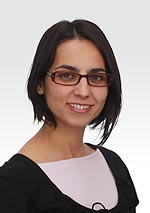 I graduated from Transilvania University (Romania) in 2002 with a passion for marketing and communication.
I graduated from Transilvania University (Romania) in 2002 with a passion for marketing and communication.
I entered the magical world of digital cinema in May 2009, when I started working as Marketing Officer for XDC, the European leader in Digital Cinema. I had the chance to be in contact with many aspects of the European cinema industry and witness first hand many of the major developments in this industry, and I thrived on the responsibility of sharing this across the industry, which I found exciting and very fulfilling.
What started out as a job turned into a passion and now, the technological and digital revolution of cinema represents my area of core expertise and professional interest.
In order to maintain its leadership in the cinema industry after the digital revolution, my company has pioneered new forms of content distribution and protection, alternative content and cross-media. As Marketing Officer, I am the communication engine behind these changes, the organizing force that coordinates the new activities and project-manages their public presentations. My professional skills cover communication, event organization and co-ordination, project management, social media marketing strategy.
Lately, I have been at the centre of the rebranding of XDC, FTT and BEWEGTE BILDER into dcinexTM. The main goal in merging these three companies is to offer exhibitors and distributors the one-stop-shop that the industry has always needed. This important project gave me the opportunity to meet and talk with the most important figureheads in European digital cinema, both exhibitors and distributors, but also manufacturers.
Feeling the pulse of the most fascinating and fast-paced industry in the world, meeting extraordinary people all the time, is far more than a job for me.
Being informed before most people about intelligent ticketing systems, seeing new projection techniques and hearing the most advanced 3D sound systems, makes my passion for digital cinema even greater. There is only one thing even more exciting: the future. Something tells me that the future of digital cinema will be more than amazing.
All different, all digital This column hosts portraits of cinemas in Europe and the rest of the world which are quite different from one another but have in common the fact that they have all adopted digital projection. G Germany: landmark cinemas choose digital projection, too Cinema Paris, Berlin
The Paris, located inside the French Cultural Institute "Maison de France", a historical building at the heart of Kurfürstendamm, comes into being as a theatre for the screening of French movies, subsequently opening up to all Europe's art-house film production, thus winning the affection and loyalty of audiences in an age dominated by multiplexes. This week's programming foresees Ken Loach's film "The Angels' Share", presented at the 2012 Cannes Festival, and "More than Honey", a documentary by Markus Imhoof on the world of bees. Thanks to satellite technology, the Paris - that became digital in July 2012 - also offers alternative content: at present the programme includes live performances from the seasons at the Bolschoi and the Nederlands DansTheater.
Cinema METROPOL, Chemnitz
The Metropol cinema in Chemnitz - a town in Saxony of around 240,000 inhabitants - screens its first film in digital format on the eve of its hundredth anniversary. Designed by the architect Wenzel Bürger in 1913, this building has lived through every step of German history in the Nineteen Hundreds. Originating as a concert hall, hotel and restaurant, it became a cinema in the '30s, surviving the Second World War despite suffering serious damage during an air raid in 1945. After 18 months of renovation, the cinema re-opened in 1947, when, on 22 April, Johann Strauss's operetta "Die Fledermaus" was screened.
The theatre's ultimate revival finally comes in 2006, thanks to Evelin Paulat, from Chemnitz, who re-opens the cinema, restoring it to its past splendour and guaranteeing its success right up to the present. Now, in 2012, this historical cinema enters the digital age, installing a Kinoton projector, as well as equipping itself with an Integrated Media Block for high frame rates. This week at the Metropol the programme includes "Asterix and Obelix: On Her Majesty's Secret Service" and "Skyfall". |
News on digitalisation worldwide ITALY Support from the Regions for Digitalisation* Lombardy Emilia Romagna * This text is an update of the article published in the DGT online informer no. 82 (Per leggere il testo in italiano cliccare qui) (Per leggere il testo in italiano cliccare qui) Agreement between ANEC and the BNL on the digitalization of cinemas
|
Spain dcinex and Odeon UCI announce an agreement for the digitalization of Cinesa The partnership between dcinex and Odeon UCI had already made it possible to digitalize 45 screens in Portugal. With their 2,153 screens in 232 cinemas, Odeon UCI Cinemas Group is the largest exhibiting company in Europe, operating under the Odeon Cinemas brand name in the United Kingdom, UCI in Austria, Germany, Italy, Ireland and Portugal, and Cinesa in Spain. (Per leggere il testo in italiano cliccare qui) Arts Alliance Media and Grupo Sade sign a VPF agreement |
Latin America Arts Alliance Media and Cinevise: following the agreement on Brazilian cinemas, Ecuador comes next (Per leggere il testo in italiano cliccare qui) Arts Alliance Media agreements with the studios for the digitalization of cinemas |
Singapore Golden Village Multiplex 100% digital |
(Per leggere il testo in italiano cliccare qui)
For further information: http://www.more2screen.com/our-content/now-booking/queen/ Christine Costello, CEO of More2Screen, spoke at the DigiTraining Plus 2012 course that took place in Amsterdam from 29 August to 2 September 2012. |

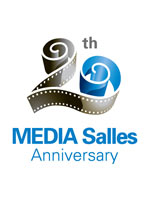
MEDIA Salles' contacts and
address
MEDIA Salles
Piazza Luigi di Savoia, 24 - 20124 Milano - Italy
Tel.: +39.02.6739781 - Fax: +39.02.6690410
E-mail: infocinema@mediasalles.it
Website: www.mediasalles.it


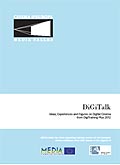 MEDIA Salles will soon publish the new edition of DiGiTalk, which will contain ideas, experiences and success stories in the field of digital projection, collected during the MEDIA Salles' course: "DigiTraining Plus: European Cinemas Experiencing New Technologies - 2012 edition" and accompanied by a section rich in tables and graphs on the state and development of digital projection in Europe.
MEDIA Salles will soon publish the new edition of DiGiTalk, which will contain ideas, experiences and success stories in the field of digital projection, collected during the MEDIA Salles' course: "DigiTraining Plus: European Cinemas Experiencing New Technologies - 2012 edition" and accompanied by a section rich in tables and graphs on the state and development of digital projection in Europe.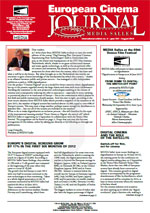
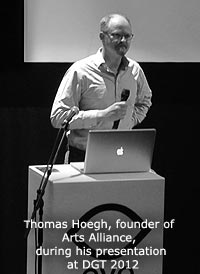

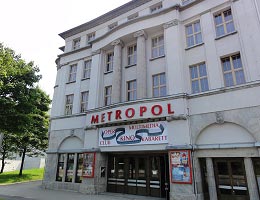
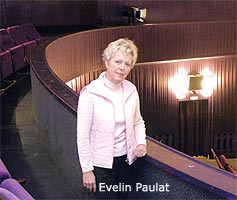 In the '80s the auditorium and the façade are completely renovated and the cinema faces another key event in Germany's history: the fall of the Berlin Wall and reunification. For a short time the Metropol is managed by Ufa (Universum Film AG), then by the Hamburg-based company "Kino Kino Entertainment" up until 2005, when it is once again closed.
In the '80s the auditorium and the façade are completely renovated and the cinema faces another key event in Germany's history: the fall of the Berlin Wall and reunification. For a short time the Metropol is managed by Ufa (Universum Film AG), then by the Hamburg-based company "Kino Kino Entertainment" up until 2005, when it is once again closed.  "Hungarian Rhapsody: Queen Live in Budapest'86" available for digital cinemas
"Hungarian Rhapsody: Queen Live in Budapest'86" available for digital cinemas